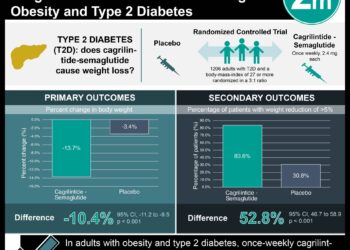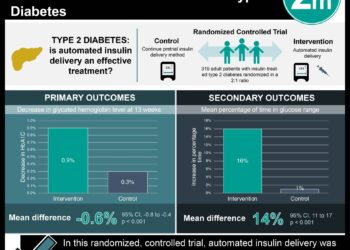Lower rates of hypoglycemia in patients treated with insulin degludec
1. Treatment with insulin degludec resulted in a lower rate of overall symptomatic hypoglycemic episodes compared with insulin glargine U100.
2. Rates of nocturnal symptomatic hypoglycemia were also lower with insulin degludec compared with insulin glargine U100.
Evidence Rating Level: 1 (Excellent)
Study Rundown: Hypoglycemia is a problem with many insulin-treated patients with type 2 diabetes (T2D). The frequency and severity tends to increase with disease progression, and it is one of the most concerning complications associated with insulin therapy. Insulin analogs U100 and glargine at similar hemoglobin levels have been shown to reduce the frequency of overall and nocturnal hypoglycemia, owing to their longer half-lives resulting in lower day-to-day variability. A meta-analysis of open-label trials from the insulin degludec phase 3a program interestingly showed that overall and nocturnal hypoglycemia were lower compared with insulin glargine U100. The SWITCH 2 trial, as presented in this study, was designed as a randomized, double-blind, 2-period crossover study to evaluate the hypoglycemia benefit from insulin degludec compared with insulin glargine U100. A total 721 patients were randomized, with 580 (80.4%) completing the trial. Rates of overall hypoglycemia were significantly lower with insulin degludec vs insulin glargine U100 (rate ratio 0.70, 95%CI 0.61-0.80, p < 0.001). Similarly, rates of nocturnal symptomatic hypoglycemia were also lower with insulin degludec vs insulin glargine U100 (rate ratio 0.58, 95%CI 0.46-0.74; p < 0.001).
Overall, the results of this study suggest that patients with T2D treated with insulin degludec have an overall lower risk of hypoglycemia. Limitations of this study include exclusion of patients not at target glycemic therapy due to the complication of handling rescue therapy, and the higher than expected withdrawal rate of the trial, and the potential of carryover effect in this crossover design. Future directions include studying the effect of similar therapies in a relevant clinical setting.
Click to read the study, published in JAMA
Relevant Reading: How hypoglycemia can affect the life of a person with diabetes
In-Depth [randomized clinical trial]: The study was designed as a randomized, double-blind, 2-period crossover, multicenter, treat-to-target trial that was conducted across 152 sites in the United States between January 2014 and December 2015. Total trial duration was 65 weeks which consisted of 32 weeks of treatment with once-daily insulin degludec or insulin glargine U100, followed by crossover to insulin glargine U100 or insulin degludec for another 32 weeks, and with 1 week of follow-up. Each 32 week period consisted of a 16-week titration (to reduce potential carryover) and maintenance (to check effect on hypoglycemic episodes) periods. Detailed inclusion criteria are included in the study. Enrolled patients fulfilled at least one of many criteria to provide greater resemblance to patients encountered in clinical practice including having experienced at least one hypoglycemic episode in the past year, moderate chronic renal failure, or exposure to insulin longer than 5 years (see study for other criteria). Patients were randomized 1:1 to one of the treatment options in a blinded manner, and to receive subcutaneous insulin via identical vials in either the morning or the evening. Primary end point was the rate of overall symptomatic hypoglycemic episodes. A hypoglycemic episode was defined as one that required third-party assistance or a confirmed low blood glucose (<56 mg/dL) during the maintenance periods. Secondary end points included nocturnal hypoglycemic episodes and the proportion of patients experiencing 1 or more severe hypoglycemic episodes during the maintenance periods.
Overall, 721 patients were randomized in this study (mean age 61.4 years, 53.1% male) and 580 (80.4%) patients completed the study. During the maintenance period, the rates of overall symptomatic hypoglycemia were lower for insulin degludec vs. insulin glargine U100. Similarly, the rates of nocturnal hypoglycemic episodes were also lower with insulin degludec. Overall, statistically significant reductions were seen with insulin degludec compared with insulin glargine for the full treatment period.
Image: PD
©2017 2 Minute Medicine, Inc. All rights reserved. No works may be reproduced without expressed written consent from 2 Minute Medicine, Inc. Inquire about licensing here. No article should be construed as medical advice and is not intended as such by the authors or by 2 Minute Medicine, Inc.







![Metformin treats Fragile X syndrome symptoms in mice [PreClinical]](https://www.2minutemedicine.com/wp-content/uploads/2017/07/Metformin_500mg_Tablets-75x75.jpg)